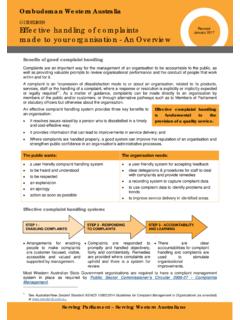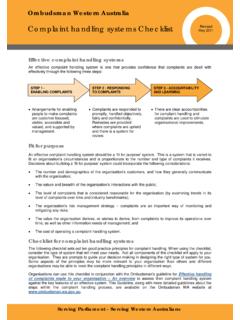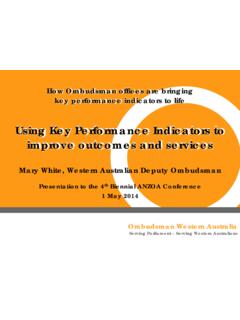Transcription of What is procedural fairness? Is there a difference …
1 ombudsman Western Australia GUIDELINES procedural fairness ( natural justice ) Serving Parliament - Serving Western Australians Revised May 2009 What is procedural fairness? procedural fairness is concerned with the procedures used by a decision-maker, rather than the actual outcome reached. It requires a fair and proper procedure be used when making a decision. The ombudsman considers it highly likely that a decision-maker who follows a fair procedure will reach a fair and correct decision. Is there a difference between natural justice and procedural fairness? The term procedural fairness is thought to be preferable when talking about administrative decision-making because the term natural justice is associated with procedures used by courts of law. However, the terms have similar meaning and are commonly used interchangeably.
2 For consistency, the term procedural fairness is used in this fact sheet. Does procedural fairness apply to every government decision? No. The rules of procedural fairness do not need to be followed in all government decision-making. They mainly apply to decisions that negatively affect an existing interest of a person or corporation. For instance, procedural fairness would apply to a decision to cancel a licence or benefit; to discipline an employee; to impose a penalty; or to publish a report that damages a person s reputation. procedural fairness also applies where a person has a legitimate expectation (for example, continuing to receive a benefit such as a travel concession). procedural fairness protects legitimate expectations as well as legal rights. It is less likely to apply to routine administration and policy-making, or to decisions that initially give a benefit (for example, issuing a licence in the first instance).
3 In some rare circumstances, the requirement to provide procedural fairness is specifically excluded by Acts of Parliament (for example, section 115 of the Sentence Administration Act 2003). The rules of procedural fairness require: a hearing appropriate to the circumstances; lack of bias; evidence to support a decision; and inquiry into matters in dispute. What is the hearing rule ? A critical part of procedural fairness is the hearing rule . Fairness demands that a person be told the case to be met and given the chance to reply before a government agency makes a decision that negatively affects a right, an existing interest or a legitimate expectation which they hold. Put simply, hearing the other side of the story is critical to good decision-making. In line with procedural fairness, the person concerned has a right: to an opportunity to reply in a way that is appropriate for the circumstances; for their reply to be received and considered before the decision is made; to receive all relevant information before preparing their reply.
4 The case to be met must include a description of the possible decision, the criteria for making that decision and information on which any such decision would be based. It is most important that any negative information the agency has about the person is disclosed to that person. A summary of the information is sufficient; original documents and the identity of confidential sources do not have to be provided; procedural fairness ( natural justice ) Revised May 2009 ombudsman Western Australia to a reasonable chance to consider their position and reply. However, what is reasonable can vary according to the complexity of the issue, whether an urgent decision is essential or any other relevant matter; and to genuine consideration of any submission. The decision-maker needs to be fully aware of everything written or said by the person, and give proper and genuine consideration to that person s case.
5 How does procedural fairness apply to an individual who may be negatively affected by a government decision? If you are going to be negatively affected by a government decision, you are entitled to expect that the decision-maker will follow the rules of procedural fairness before reaching a conclusion. In particular, you are entitled to: Be told the case to be met (for example, that an agency is considering withdrawing an existing entitlement or benefit such as a rebate or an allowance), including reasons for this proposal and any negative or prejudicial information relating to you that is to be used in the decision-making process. The case to be met could be a letter or a draft report, or it could be a summary of the issues being considered by the decision-maker. It is not necessary for you to receive copies of all original documents or the identity of confidential sources be revealed.
6 A real chance to reply to the case to be met, whether that be in writing or orally. The type of hearing should be proportional to the nature of the decision. For instance, if the consequences of the proposed decision are highly significant, a formal hearing process may be warranted. In contrast, if the matter is relatively straightforward, a simple exchange of letters may be all that is needed. Generally, in any oral (or face-to-face) hearing, it is reasonable to bring a friend or lawyer as an observer, so you may wish to consider this. In your reply, you may, amongst other things, wish to: deny the allegations; provide evidence you believe disproves the allegations; explain the allegations or present an innocent explanation; and provide details of any special circumstances you believe should be taken into account.
7 You must have the chance to give your response before the decision is made, but after all important information has been gathered. This is so you can be given all the information you are entitled to and be aware of the issues being considered by the decision-maker. The decision-maker should have an open mind (be free from bias) when reading or listening to what you have to say. How does procedural fairness apply to an investigator? If you are investigating a matter or preparing a report for a decision-maker, it is good practice to consider the requirements of procedural fairness at every stage of your investigation. procedural fairness is an essential part of a professional investigation and benefits both parties. As an investigator, acting according to procedural fairness can help you by providing: an important means of checking facts and identifying major issues comments made by the subject of the complaint that can expose weaknesses in the investigation advance warning of areas where the investigation report may be challenged.
8 Depending on the circumstances, procedural fairness requires you to: inform those involved in the complaint of the main points of any allegations or grounds for negative comment against them. How and when this is done is up to you, depending on the circumstances provide people with a reasonable opportunity to put their case, whether in writing, at a hearing or otherwise. It is important to weigh all relevant circumstances for each individual case before deciding how the person should be allowed to respond to the allegations or negative comment. procedural fairness ( natural justice ) Revised May 2009 ombudsman Western Australia Level 2, Albert Facey House, 469 Wellington Street Perth WA 6000 PO Box Z5386 St Georges Terrace Perth WA 6831 Tel 08 9220 7555 Freecall (outside metropolitan area) 1800 117 000 Fax 08 9220 7500 Email Website In most cases it is enough to give the person opportunity to put their case in writing.
9 In others, however, procedural fairness requires the person to make oral representations. Your ultimate decision will often need to balance a range of considerations, including the consequences of the decision hear all parties to a matter and consider submissions make reasonable inquiries or investigations before making a decision. A decision that will negatively affect a person should not be based merely on suspicion, gossip or rumour. there must be facts or information to support all negative findings. The best way of testing the reliability or credibility of information is to disclose it to a person in advance of a decision, as required by the hearing rule only take into account relevant factors act fairly and without bias. If, in the course of a hearing, a person raises a new issue that questions or casts doubt on an issue that is central to a proper decision, it should not be ignored.
10 Proper examination of all credible, relevant and disputed issues is important conduct the investigation without unnecessary delay ensure that a full record of the investigation has been made. Of course, wherever there is a requirement to apply particular procedures in addition to those that ensure procedural fairness, the terms of that statutory obligation must also be followed. The ombudsman recommends that whenever it is proposed to make adverse comment about a person, procedural fairness should be provided to that person before the report is presented to the final decision-maker. This should be done as a matter of best practice. there is no requirement that all the information in your possession needs to be disclosed to the person. However in rare cases, such as a serious risk to personal safety or to substantial amounts of public funds, procedural fairness requirements may need to be circumvented due to overriding public interest.









